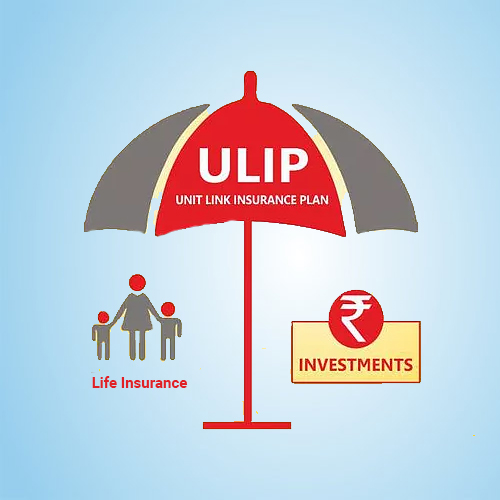Life Insurance

Why Do You Need Life Insurance?
- Secure your family’s financial future
- Accomplish your financial goals
- Brings peace of mind
- Save tax

Types of Life Insurance Policies

Term Insurance
It is a legally binding contract between the insured person and the insurer, in which a death benefit is paid to the beneficiary if the insured person dies during the term of the policy. The person taking the term insurance plan agrees to pay the insurance premium to the insurer (i.e., the insurance company ). In return, the insurer promises protective financial cover over the life of the insured person. The insurance cover offered by a term insurance plan is valid only for specified policy term. This term can range from 10 years to 30 years or more, depending on the age at which you take in the term insurance plan.
Why Term Insurance Policy?
Term insurance is one of the primary insurance and investment needs in your financial life. Term insurance should ideally offer full protection of the financial future of your family. Meaning, a term insurance plan should take care of the following in your absence:
a) Living expenses of your family
b)Pay off the outstanding debt
c) Help invest for important future goals
Thus, you need term insurance so that you can:
i. Provide Financial Security to Your Family
If you are the sole breadwinner of your family, you essentially need term insurance to secure the financial needs of your family. In case of your untimely death, it will support your family’s financial needs.
ii. Mitigate Risks Related to Lifestyle
Generally, with old age, your risk of death increases. This risk also increases with certain lifestyle habits such as smoking, drinking, or an odd job. The term life plan covers all such risks against an extra amount of premium.
iii. Pay Outstanding Debt in your Absence
If you have certain outstanding debts/loans, your family can be in big trouble, if you meet an untimely death. However, the term life plan also provides you with a certain amount from your sum assured for paying your outstanding debts.
your outstanding debts.
iv. Help your Family Meet Important Financial Goals in your Absence
Financial goals like your child’s higher education are important in life for continued financial well-being. A term insurance cover with a large enough sum assured will ensure that your family can meet such goals financially. Thus, ensuring long-term financial stability.

Unit Linked Insurance Plans
Unit Linked Insurance Plans, popularly known as ULIPs, are insurance plans that provide the benefits of insurance coverage as well as a market-linked investment. ULIPs are goal-based financial solutions, linked to the capital market. Thus, allowing the flexibility to invest in equity or debt funds, depending on the investor’s risk appetite. ULIPs help with capital appreciation over a long period of time, while providing insurance coverage.
Benefits of ULIP Plans
1. Maturity benefits- If a policyholder survives beyond the maturity period of the policy, he/she gets the accumulated fund as the maturity/survival benefit from the insurer. The amount paid as maturity benefits is equal to the fund value. The maturity benefits are exempted from tax under Section 10(10D) of the Income Tax Act, 1961.
2. Death benefits-In the case of the unforeseen demise of the policyholder during the tenure of the policy, the death benefits are paid to the family member of the policyholder, who is registered as the beneficiary. The amount paid as a premium for ULIP is eligible for a tax deduction for a maximum of Rs.1,50,000/- during a year under section 80C of the Income Tax Act, 1961. Moreover, the maturity benefits received are exempted from tax under Section 10(10D) of the Income Tax Act, 1961.
3. Long-term investment benefits- The longer the investment time horizon, the more you are insulated from the price fluctuations of the market. Investing in the market for the long term gives higher returns and helps you deal with market volatility. ULIP lets you invest in the market for the long term so that you get high returns on your investments.
4. Withdrawal benefits- ULIP allows partial withdrawal of funds to investors in case of any emergencies. After a fixed time, investors can withdraw funds up to a certain limit to meet their financial requirements.

Child Insurance Plan
A child insurance plan is an investment cum insurance plan from life insurance companies, which offers the financial security required for your child’s dreams and goals. You can use a child insurance plan to invest in the big life goals of your child like higher education and marriage.
While you are building the corpus to fulfill these goals for your child, an insurance plan provides a safety cushion to the corpus in case of your untimely demise. In the unfortunate event of your passing away before fulfilling the goal, the plan can invest the money on your behalf and give the maturity amount that you originally aimed for your child.
Benefits of a Child Insurance Plan
1. A child plan will help you provide for your child’s important life goals regardless of your presence in his or her life. With life cover and goal protection options, a child plan alone is enough to protect your child’s future whether through investment or life cover.
2. Tax Benefits of child insurance plans are well known. You can reduce your taxable income by up to Rs.1,50,000 every year if you invest in child plans. The maturity and partial withdrawals from the plans are also exempt from tax.

Money Back Insurance Plan
In the case of the life insured's death, a standard insurance plan pays out a lump sum amount to the nominee of the policyholder. This is known as the death benefit of life insurance. On the other hand, a money-back policy is a form of life insurance policy that allows the insured to receive a portion of the sum assured at regular intervals rather than a lump sum at the end of the policy period. As a result, a money-back insurance policy is an endowment scheme with certain liquidity.
Benefits of Money Back Insurance Plan
1. Survival Benefit
Throughout the policy, money is paid to the policyholder every few years. The payment begins within a few years of the policy's inception and lasts until the policy's maturity.
Consider this scenario: Akash has chosen a money-back policy with a sum assured of Rs. 5 lakhs over 20 years. He will have to pay a 20-year premium and receive a portion of the sum assured at regular intervals.
Depending on the policy terms, he may receive 15% of the sum assured after the 5th, 10th, and 15th years of the policy, as a survival benefit, this is 15 X 3 = 45 % of the sum assured. He will also receive the remaining 55% of the amount guaranteed, plus any bonus, at maturity.
2. Death Benefit
In the event of an unfortunate incident, the policy nominee will receive the insurance amount. This includes the sum assured as well as any bonuses accumulated on the money-back policy.
3. Maturity Benefit
The insured individual receives the maturity benefit when the money-back plan matures, and it consists of:
a. Sum Assured: It is the complete cover amount that the insured selects at the start of the policy.
b. Bonus: This includes the insurer's declared reversionary benefits that have accumulated over time. This is largely determined by the company’s performance.
4. Tax Benefit
Section 80C of the IT Act, allows you to deduct up to Rs. 1,50,000 on account of life insurance premiums from your taxable income per year. In addition, Section 10(10)D exempts the maturity benefit of the money-back policy from income tax.

Endowment Insurance Plans
An endowment policy is a type of life insurance policy designed to pay a lump sum on maturity or death. An endowment policy can be used to build a risk-free savings corpus while providing financial protection for families in case of an unfortunate event. This simplicity of an endowment plan has over the years made it an attractive savings plan for all.
A good endowment policy provides you with the confidence to meet any financial emergency in the future. It provides you with returns that can help you meet your non-negotiable life goals, such as your child’s education or marriage, fulfilling the needs and aspirations of your loved ones and yourself, and more.
Benefits of an Endowment Policy
There are broadly four benefits of an endowment policy.
1. Life Insurance Benefit - Your loved ones are always taken care of. The life insurance benefit gives a lump sum pay-out, ensuring that even in your unfortunate absence your family members can continue to live the life with the same standard and dignity. This is a fixed amount and is given to your nominee/legal heir. Do remember some policies also give guaranteed additions and Reversionary Bonus which are considered in the calculation of death benefit.
2. Maturity Benefit - As long as you pay timely premiums and keep the endowment policy active, the maturity benefit is intact. This is a guaranteed maturity benefit amount that will enable you to meet your financial goals. This maturity benefit depends on the policy term, policy premium, premium payment term, age, and gender. You may get guaranteed additions on maturity in some policies. Apart from this, in participatory policies, you may also get accrued reversionary bonuses and terminal bonuses.
3. Tax Benefit - Endowment insurance plans also offer tax benefits. The premiums you will pay can help you reduce your taxable income under Section 80C of the Income Tax Act, 1961. There are tax benefits available on the maturity of endowment policies as well. This helps you save tax at the time of inception of the policy and accumulation stage, and also the maturity stage.
4. Loan Benefit -
Endowment policies can help you to get a loan. After a policy acquires a surrender value, you can take a loan against the policy. The interest charged on such loans is quite competitive. For instance, some traditional plans offer a loan amount of up to 80% of the surrender value. The loan benefit helps you arrange funds in an emergency.
5. Option to add riders - Endowment plans offer additional riders to enhance the coverage of the plan. You can add a critical illness rider, an accidental death rider, or a permanent disability rider and enjoy increased protection.
6. Low risk - An endowment policy is usually a low-risk investment. Your money grows over time with most endowment products and your returns are guaranteed.
7. Dual purpose - You get to enjoy the dual benefit of insurance as well as investment. Your savings continue to build over time and your family stays secure in the case of an unfortunate event.
